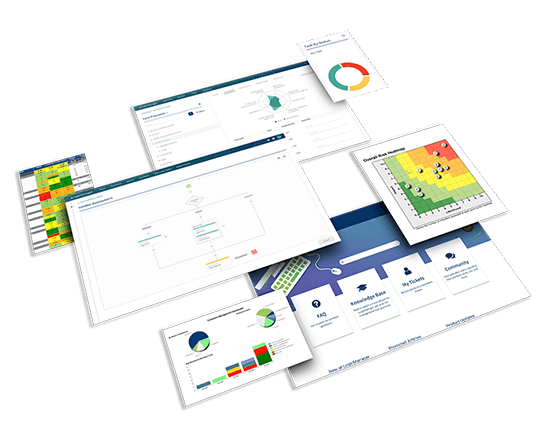
Navigating New Data Privacy Laws: Key Considerations for Businesses in Today’s Interconnected World
The Importance of Data Privacy in the See-Through Economy
In today's interconnected world, data privacy has become a critical concern for businesses. With the introduction of new data privacy laws in several states, similar to California's CCPA and European GDPR standards, organizations must be proactive in protecting customer data and ensuring compliance. As data breaches continue to make headlines, customers and investors are becoming increasingly cautious about sharing their personal information. The see-through economy means that any data breach can have a severe impact on a business's reputation, leading to lost trust and potential financial repercussions.
Virginia's data privacy law is known as the Virginia Consumer Data Protection Act (VCDPA). It became effective and enforceable on January 1, 2023. The VCDPA grants certain rights to Virginia residents regarding the collection, use, and disclosure of their personal information by businesses.
California has made amendments to its existing data privacy law, the California Consumer Privacy Act (CCPA). These amendments, known as the California Privacy Rights Act (CPRA) or Proposition 24, became effective on January 1, 2023, and are enforceable as of July 1, 2023. The CPRA expands and enhances privacy rights for California residents and imposes additional obligations on businesses.
Colorado's data privacy law is called the Colorado Privacy Act (CPA). It became effective and enforceable on July 1, 2023. The CPA introduces new privacy rights for Colorado residents and imposes obligations on businesses that collect and process their personal information.
Connecticut passed a data privacy law called the Connecticut Data Privacy Act (CDPA). It became effective and enforceable on July 1, 2023. The CDPA aims to enhance privacy rights for Connecticut residents and introduces requirements for businesses that collect, process, or sell personal information.
Utah's data privacy law is known as the Utah Consumer Privacy Act (UCPA). It became effective on May 5, 2021, but enforcement provisions are delayed until December 31, 2023. The UCPA grants certain rights to Utah residents regarding the processing of their personal data and imposes obligations on businesses.
The above laws apply to businesses that collect or process the personal information of over 100,000 consumers, generate at least half of their revenue from the sale of personal data, or have an annual revenue of over $25 million. Failing to comply with data privacy regulations can expose companies to lawsuits and fines due to negligence, such as the £18.4 million fine imposed on Marriot for their 2018 data breach. It's evident that businesses need to take data privacy seriously to protect their interests and maintain customer trust.
Data Privacy Compliance Challenges for Businesses Expanding Across Jurisdictions
Expanding operations across different states or entering international markets introduces a unique business challenge. Each jurisdiction may have its own set of data privacy laws and regulations, making compliance a complex task. For example, companies operating in the European Union must adhere to the General Data Protection Regulation (GDPR) and companies operating in Saudi Arabia must comply with the Personal Data Protection Law (PDPL). In the United States, there is a growing desire for individuals to have the right to control how their personal data is collected and used. More states are likely to adopt data privacy laws in the future, and businesses need to proactively prepare for evolving regulatory landscapes.
Here are some steps you can take now to prepare for the new data privacy laws.
- Understand the Applicable Laws: Stay informed about the data privacy laws that are relevant to your business, such as the General Data Protection Regulation (GDPR) in the European Union, the California Consumer Privacy Act (CCPA), and other regional or industry-specific regulations. Familiarize yourself with the specific requirements and obligations imposed by these laws.
- Conduct a Data Audit: Perform a comprehensive audit of the data your company collects, processes, stores, and shares. Identify the types of data you collect, where it comes from, how it's used, and with whom it's shared. This audit will help you assess compliance gaps and develop strategies to address them.
- Implement Data Protection Policies: Establish clear and robust data protection policies and procedures. These should outline how your company handles personal data, including data collection, storage, retention, sharing, and security measures. Ensure that these policies align with the principles and requirements of the relevant data privacy laws.
- Update Contracts and Agreements: Review and update your contracts and agreements with third-party service providers, data processors, and vendors to include data protection clauses and requirements. Ensure that these agreements meet the standards set by data privacy laws and clearly define the responsibilities of each party regarding data protection.
- Monitor and Review Compliance: Establish a process for ongoing monitoring and review of your company's data protection practices. Regularly assess your compliance with data privacy laws, update policies and procedures as needed, and address any identified weaknesses or gaps. Stay updated on changes in the regulatory landscape to adapt your practices accordingly.
A Risk-Based Approach with Data Privacy Management Software
Many organizations face the challenge of gathering risk-related information from various departments and individuals, using disparate methodologies and tools. This fragmented approach makes it difficult to locate, compare, and aggregate risk information – especially when branches may be located in multiple states or countries. To overcome this hurdle, organizations need to establish a robust ERM framework that centralizes risk data and facilitates a cohesive understanding of risks. A risk-based approach will allow organizations to effectively prioritize risks and ensure compliance. A well-designed taxonomy within the ERM framework allows organizations to compare risks across different departments and locations, ensuring a consistent and comprehensive approach to risk management.
Adopting a risk-based mindset enables organizations to strategically allocate their resources to areas that hold the most value in terms of privacy protection and compliance. By identifying potential risks and vulnerabilities, companies can proactively implement measures to mitigate those risks and improve their overall data privacy posture. Moreover, embracing a risk-based approach fosters a culture of accountability and ensures that privacy considerations are integrated into business decision-making processes.
To effectively implement an ERM framework and streamline risk management processes, organizations can leverage enterprise risk management software. LogicManager is built on a solid framework of risk-based best practices and simplifies your due diligence endeavors, allowing you to concentrate on enhancing your business performance (while we ensure your organization's adherence to privacy laws). Our privacy risk management solution provides the necessary tools for data collection, risk assessment, and compliance monitoring, making the complex task of managing data privacy risks more manageable.
With the enforcement of new data privacy laws, businesses need to prioritize risk management and compliance to protect their reputation in the See-Through Economy. By adopting a risk-based approach and leveraging appropriate software solutions, organizations can proactively protect customer data, comply with regulations, and mitigate potential reputational and financial risks. By embracing a risk-based mindset and building a robust ERM framework, businesses can navigate the evolving data privacy landscape and position themselves as responsible custodians of sensitive information.
Remember, data privacy is not just a legal obligation but also an opportunity to build trust, enhance customer loyalty, and maintain a competitive edge in today's data-driven world.

